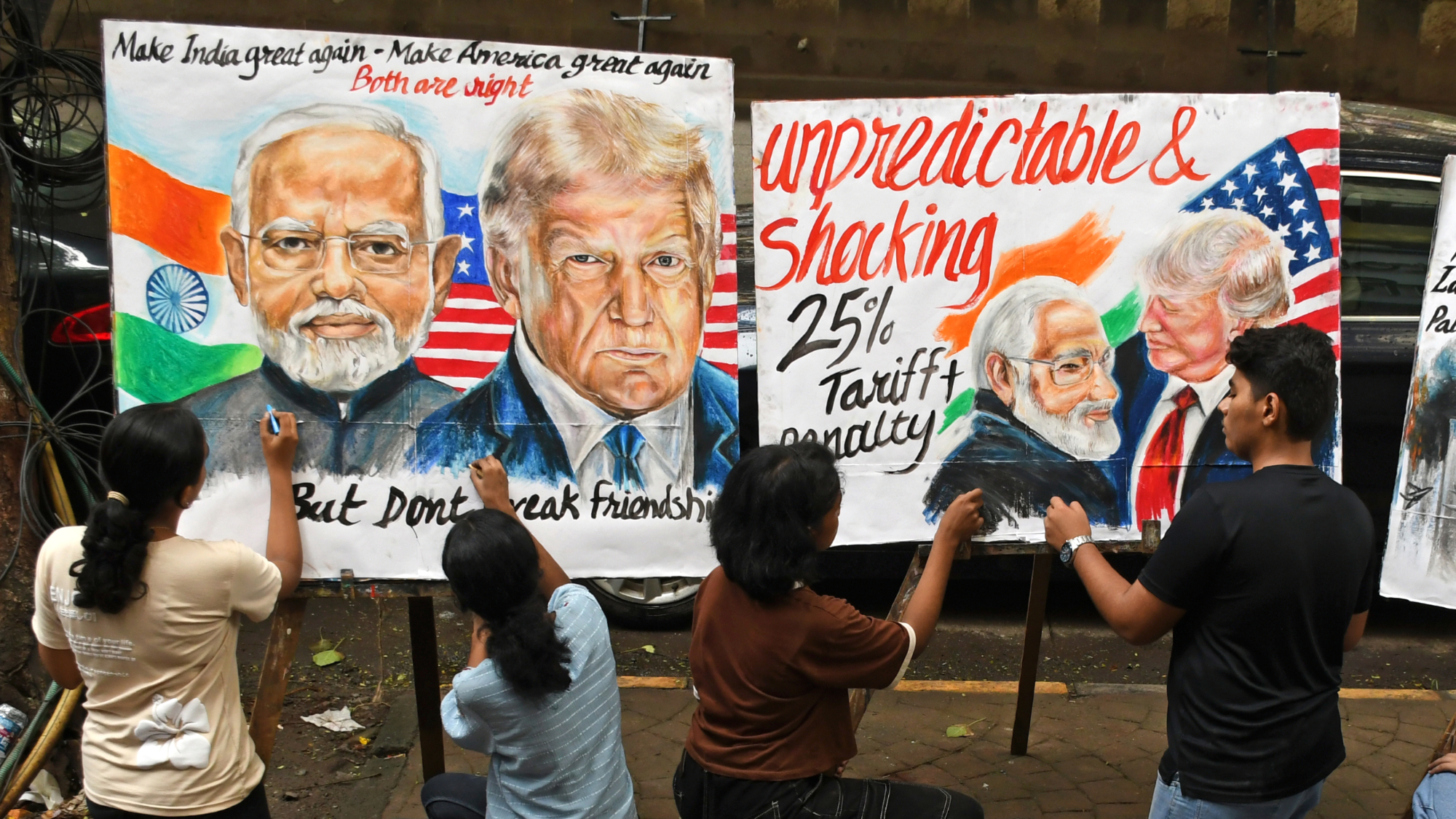India rejects Trump threat over Russian oil
The president said he would raise tariffs on India for buying and selling Russian oil


A free daily email with the biggest news stories of the day – and the best features from TheWeek.com
You are now subscribed
Your newsletter sign-up was successful
What happened
President Donald Trump Monday said he would "substantially" raise tariffs on India for "buying massive amounts of Russian oil" and "selling it on the open market for big profits," elaborating on his threat last week to impose a penalty on top of a 25% tax for Indian imports. "They don't care how many people in Ukraine are being killed by the Russian War Machine," he said on social media Monday.
Who said what
India's foreign ministry called Trump's "targeting" of the country "unjustified and unreasonable," and said New Delhi would "take all necessary measures to safeguard its national interests and economic security." China, the other top buyer of Moscow's oil, last week also rejected Trump's tariffs-linked demand to cut back on Russian imports.
Despite India's "defiance," its "main refiners paused buying Russian oil last week," Reuters said. But the "unpredictability of the Trump administration" makes negotiating difficult. "Given the wild fluctuations in Trump's policies," the U.S. "may return to high fives and hugs" with India, or even Russia, Sreeram Chaulia of New Delhi's Jindal School of International Affairs told The Associated Press.
What next?
Trump's oil outbursts "reflect his frustration with the pace of trade talks with India" and are mostly about "trying to play hardball in negotiations," the AP said, citing a White House official. Trump has also set a Friday deadline for Russia to halt its bombing of Ukraine or face new sanctions, though President Vladimir Putin has so far "shown no public sign of altering his stance," Reuters said.
The Week
Escape your echo chamber. Get the facts behind the news, plus analysis from multiple perspectives.

Sign up for The Week's Free Newsletters
From our morning news briefing to a weekly Good News Newsletter, get the best of The Week delivered directly to your inbox.
From our morning news briefing to a weekly Good News Newsletter, get the best of The Week delivered directly to your inbox.
A free daily email with the biggest news stories of the day – and the best features from TheWeek.com
Peter has worked as a news and culture writer and editor at The Week since the site's launch in 2008. He covers politics, world affairs, religion and cultural currents. His journalism career began as a copy editor at a financial newswire and has included editorial positions at The New York Times Magazine, Facts on File, and Oregon State University.
-
 Will increasing tensions with Iran boil over into war?
Will increasing tensions with Iran boil over into war?Today’s Big Question President Donald Trump has recently been threatening the country
-
 Corruption: The spy sheikh and the president
Corruption: The spy sheikh and the presidentFeature Trump is at the center of another scandal
-
 Putin’s shadow war
Putin’s shadow warFeature The Kremlin is waging a campaign of sabotage and subversion against Ukraine’s allies in the West
-
 Judge orders Washington slavery exhibit restored
Judge orders Washington slavery exhibit restoredSpeed Read The Trump administration took down displays about slavery at the President’s House Site in Philadelphia
-
 Kurt Olsen: Trump’s ‘Stop the Steal’ lawyer playing a major White House role
Kurt Olsen: Trump’s ‘Stop the Steal’ lawyer playing a major White House roleIn the Spotlight Olsen reportedly has access to significant US intelligence
-
 Hyatt chair joins growing list of Epstein files losers
Hyatt chair joins growing list of Epstein files losersSpeed Read Thomas Pritzker stepped down as executive chair of the Hyatt Hotels Corporation over his ties with Jeffrey Epstein and Ghislaine Maxwell
-
 Judge blocks Hegseth from punishing Kelly over video
Judge blocks Hegseth from punishing Kelly over videoSpeed Read Defense Secretary Pete Hegseth pushed for the senator to be demoted over a video in which he reminds military officials they should refuse illegal orders
-
 Trump’s EPA kills legal basis for federal climate policy
Trump’s EPA kills legal basis for federal climate policySpeed Read The government’s authority to regulate several planet-warming pollutants has been repealed
-
 House votes to end Trump’s Canada tariffs
House votes to end Trump’s Canada tariffsSpeed Read Six Republicans joined with Democrats to repeal the president’s tariffs
-
 Bondi, Democrats clash over Epstein in hearing
Bondi, Democrats clash over Epstein in hearingSpeed Read Attorney General Pam Bondi ignored survivors of convicted sex offender Jeffrey Epstein and demanded that Democrats apologize to Trump
-
 El Paso airspace closure tied to FAA-Pentagon standoff
El Paso airspace closure tied to FAA-Pentagon standoffSpeed Read The closure in the Texas border city stemmed from disagreements between the Federal Aviation Administration and Pentagon officials over drone-related tests
